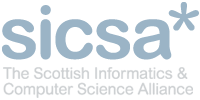Date/Time
Date(s) - 30/06/2023
9:00 am - 5:00 pm
Location
The National Robotarium
“Robotics in a Sustainable world: accelerating or hinder” is sponsored by the SICSA AI and Cyber Physical Systems Research Themes and is taking place on 30 June 2023 at The National Robotarium.
The event is free to attend and you can register on Eventbrite
The rECOver group focuses on identifying and developing robotics as a sustainable technology and their potential contribution to a more sustainable world while identifying and working to overcome the social and economic implications associated with their integration by closing the gap between domestic and international policymakers and industrial partners.
The rECOver group comprises of a unique combination of cross discipline researchers including scientists, lawyers, sociologists and engineers.
Initially, rECOver is seeking to initiate conversation and collaboration among scientists, engineers, policymakers and social scientists to analyse the use of robotics in mineral acquisition for and recycling of sustainable or ‘green’ technologies by combining both techno-economic and socio-political analysis.
The nature of the challenges being addressed are inherently interdisciplinary and require substantive input and engagement across disciplinary divides. It is recognised and understood that cross-disciplinary and inter-sectoral involvement is essential from the beginning to allow design and innovation output to be optimised. The most effective and necessary method of achieving this within a multidisciplinary ecosystem is to first develop a shared understanding of the key questions, challenges and opportunities in each discipline in order to develop an understanding of the complex interplay of policy and technology.
This ‘Collider Event’ will bring together these sectors into a multidisciplinary group of experts to engage in discussions that will identify and draw out key principles and issues that should be addressed when using robotics for sustainability and focus on questions such as:
•Robotics in a sustainable world: are they accelerating or hindering the objectives?
•Can the increased use of robotics for sustainable mining affect the critical material supply?
•How does the contribution of robotic technology affect the transition to a circular economy?
•How can potential negative socio-economic or political impacts of robotics use be mitigated?
Robotic technology is increasingly being used to drive us to a more sustainable world, for example, in the offshore wind sector. However, whether and how robotics themselves can be made more sustainable – socially and environmentally – is emerging as an issue of debate. The development and use of these robots require coherent interdisciplinary analysis suitable to understanding their potential socioeconomic and environmental downsides and to create better regulatory approaches to incentivize innovation while avoiding negative externalities.
The facilitated discussions at the collider event will inform the identification and development of further novel research by the group into new sustainable energy technologies, new technologies for the acquisition of minerals for or the recycling of existing or emerging technologies, and into more suitable policy environments for developing technological solutions to environmental challenges.
The overall aim of the Collider Event, therefore, is to bring policy and technology together to avoid negative externalities associated with apparently ‘green’ technology solutions. We recognize that constructing intricate and trans-scalar (international, national, and local) policy environments that can facilitate the development of technological systems that minimise negative externalities must be a collective and inclusive process that reaches beyond academia and incorporates policymakers and private industry partners in shaping research questions and methods. This is where the research must start; with a collaborative and trans-sector discussion of what questions need answering most urgently.







